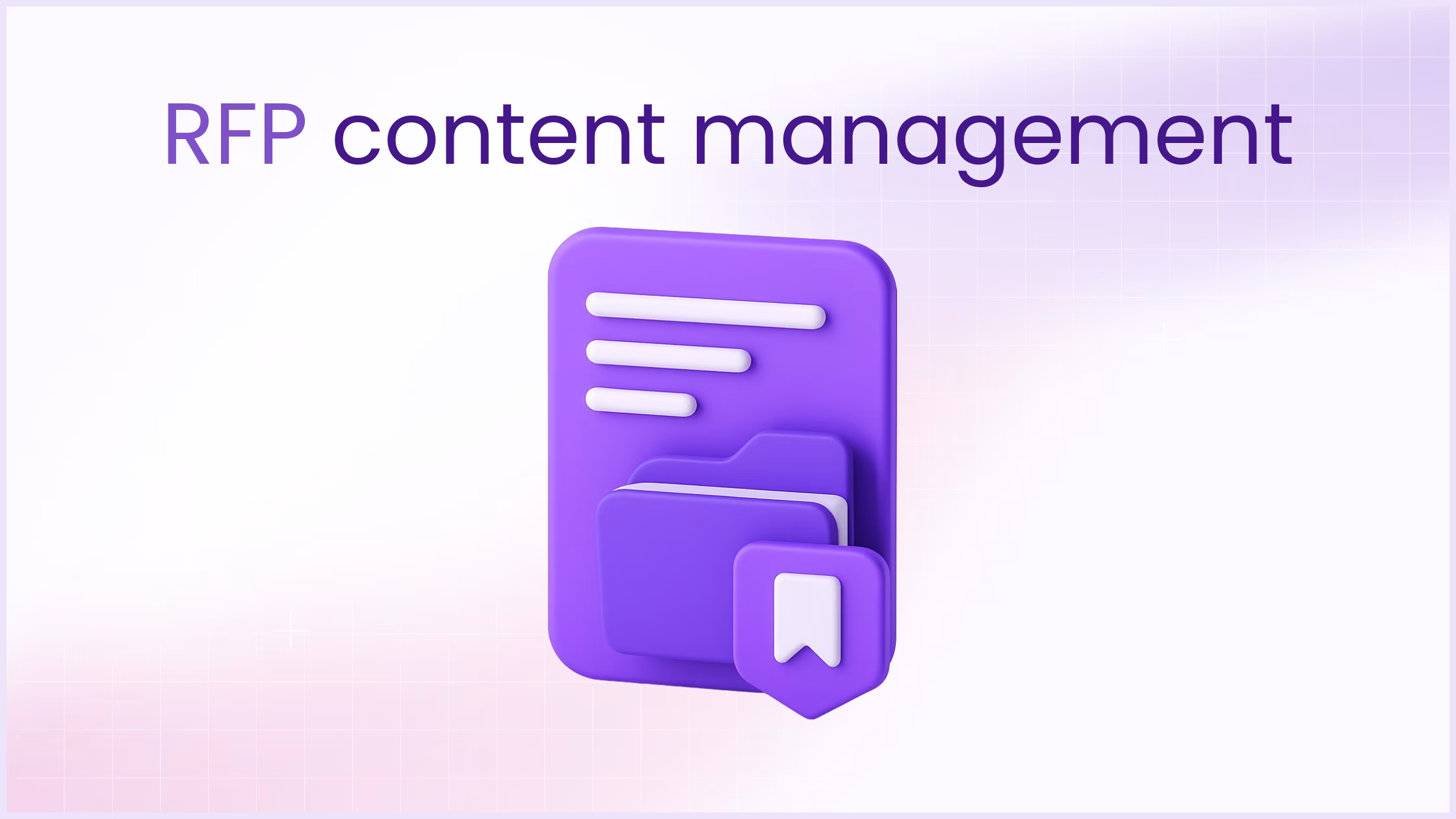Your team faces hundreds of pages of RFPs and complex questions that demand organized, accessible answers.
A request for proposals requires both structured processes and documentation to solicit the best bids. Get your RFP content management organized right, and you win more deals.
Whether you’re organizing existing content or building systematic approaches for future RFPs, this guide delivers proven methods that streamline your entire RFP response process. Take your RFP workflow from scattered chaos to winning clarity.
Build your proposal content management foundation with the Solve Loop
Stop reinventing answers for every RFP. The Solve Loop gives you a practical approach for daily proposal work while building valuable content that wins future deals.
Capture content as you respond
Create and save RFP content in real-time as you respond. This “capture as you go” approach ensures no valuable information gets lost. Save everything new, even unique questions often reappear. Each RFP becomes an investment that pays dividends for future proposals, adding to your proposal content library and RFP repository.
Structure your RFP library for instant access
If your RFP library is the heart, then its structure is the backbone. Well-structured libraries help teams find answers fast, while disorganized repositories become unwieldy nightmares.
Ask these questions: Is it intuitive for newcomers? Are category names clear? Have you eliminated duplicates? Can it scale as you grow? Use folders and tags to categorize by topic, product, or department. Make relevant information instantly discoverable as part of your content management workflow process.
Reuse smart, personalize everything with an RFP platform
Find past RFP answers quickly, and auto-populate them directly into new documents with RFP software or an RFP platform. But reusing doesn’t mean sending identical proposals. Use saved time to personalize each answer for specific clients.
Think of it as repurposing rather than reusing, balancing efficiency with customization that clients value.
Schedule regular content audits
RFP answers evolve with your business. Regular “weeding” keeps content fresh. Set audit schedules to review three categories: duplicate answers to merge, unused content to remove, and valuable answers that need better organization within your proposal content repository.
Don’t fear deletion, lean, high-quality libraries save more time than preserving content “just in case.”
Optimize your RFP strategy with smart analytics
Move beyond basic content management to strategic optimization. The Evolve Loop focuses on continuous improvement and long-term value creation for your proposal library.
Track automation rates to measure real performance
The automation rate shows how many RFP questions your system answers automatically. Well-structured RFP automation processes deliver higher automation rates with less manual searching and response creation.
Monitor 4 key metrics for optimization
Track these essential measurements to optimize your RFP content management:
- Content usage – Identify your most valuable answers by tracking frequency in proposals. Update responses used most often first. Retire rarely-used content.
- Content freshness – Measure recent reviews and updates. Declining freshness often means you’re creating new answers because existing ones are outdated.
- Content performance – Gather post-deal feedback on winning proposal responses.
- Answer automation – Calculate automated responses versus manual insertions. Higher percentages mean better library performance.
Redesign structure based on team input
Your library structure should match how teams work. Simplify categories, reduce unnecessary tags, and organize content in ways that reflect your services and solutions. Real user experiences drive better organization, forming the basis of a strong content management strategy.
Share insights across departments
Your RFP library contains valuable client intelligence. Proposal requests reveal client concerns, pain points, and goals. Share these insights with sales, marketing, and product teams. This cross-team alignment supports better knowledge management and fuels proposal development processes that close more deals.
Get your team aligned for RFP success
Your RFP content management system works only as well as the people behind it. Clear roles and smooth collaboration turn sophisticated tools into winning results.
Assign content owners and moderators
Start with dedicated ownership. Employ a dedicated Content Manager or establish a Content Committee that knows your proposal content management and content management process inside out. This individual or team serves as the central point of contact, facilitating collaboration between departments while ensuring everyone has access to the latest materials.
Key responsibilities include:
- Maintaining an organized library of reusable content
- Ensuring consistency in tone, style, and messaging
- Coordinating with subject matter experts (SMEs), writers, and designers
- Verifying content meets compliance requirements
Engage SMEs with clear expectations
SMEs create your most compelling content, but supporting RFPs isn’t their primary job. Set clear expectations about what you need from them. Give SMEs guidelines on verifying technical accuracy rather than wordsmithing content.
Approach busy experts in ways that work best for them, some prefer quick calls over written responses. Build relationships by understanding each person’s expertise, preferences, and availability. Involve SMEs in proposal kickoff meetings and regular content updates to help them feel invested in the process.
Create a content review schedule
Structured review cycles maintain content accuracy without chaos. Schedule regular checks rather than relying on ad-hoc reviews. Delegate specific responsibilities to different reviewers, SMEs for accuracy, writers for consistency, and managers for quality assurance.
Automate calendar reminders to notify team members when content needs review. This keeps everyone on track without constant manual follow-ups.
Get leadership buy-in for long-term success
Your workflow won’t progress far without senior management support. Present the business case by highlighting how structured RFP management directly impacts proposal quality and win rates.
Share progress with leadership regularly to ensure continued buy-in and resources.
Smart tools speed up your RFP process
RFP software solutions deliver real results by giving teams a single source of truth for all proposal content.
Automate the tedious work
Stop parsing documents manually. RFP automation software handles question extraction, deadline tracking, and report generation automatically. AI capabilities auto-populate responses from your RFP content repository, turning days of work into minutes. Calendar reminders keep SME reviews on track without constant follow-ups.
Enable seamless team collaboration across the RFP repository
Centralized RFP solutions change how your team works together. Every update becomes instantly available to everyone. No more version control nightmares. Role-specific permissions show team members exactly what they need while supporting remote collaboration across locations.
Find content fast with smart tagging
Effective tagging beats traditional folders every time. Follow these content management best practices:
- Use a consistent set of common tags across the organization
- Apply a small number of tags to each entry
- Keep formatting consistent to avoid duplicates
- Avoid overly specific tags
Combined with rating systems, you can locate your best-performing content instantly when responding to proposals.
Connect with your existing systems
CRM integration ties proposal projects directly to deals, giving you visibility into revenue impact. Your customer data flows seamlessly into proposal content, ensuring consistency across all client touchpoints.
The hidden costs of inefficient RFP management
- Wasted time & effort: Proposal teams spend countless hours digging through scattered files and outdated documents just to find the right answers. That's time they could be spending on customizing proposals and winning new business.
- Outdated information: On average, content libraries degrade by 22% each month. This creates a risk of submitting proposals with incorrect information, which can damage your credibility.
- Recreating the wheel: Most RFPs contain questions that have been answered before. Yet, teams often spend valuable time recreating responses from scratch, leading to inconsistencies and wasted effort.
- SME bottlenecks: Subject matter experts (SMEs) are repeatedly pulled away from their primary responsibilities to answer the same questions. This creates a bottleneck that slows down the entire proposal process and prevents your experts from focusing on their core work.
A smarter way to manage your RFP content with SiftHub
It's time to stop struggling with these manual, time-consuming tasks and start leveraging your organization's collective knowledge. SiftHub offers a modern approach to RFP content management that allows your team to work faster and smarter.
With SiftHub's smart repository, all your content is centralized with AI-powered tagging and categorization, so you can find what you need in seconds. Our Automated Content Freshness capabilities and expiration alerts put an end to submitting outdated information.
Imagine your team using AI-generated first drafts of responses, pulling from a pre-approved response library of expert answers. This not only speeds up the process but also frees up your SMEs to focus on what they do best, allowing them to contribute once and benefit multiple times.
By adopting SiftHub's unified collaboration platform, you can eliminate version control nightmares and ensure consistency across every proposal. The result is a more efficient, accurate, and consistent process that allows your team to scale its proposal capacity while maintaining quality.
Ready to see how SiftHub can transform your proposal process? Try SiftHub today.










